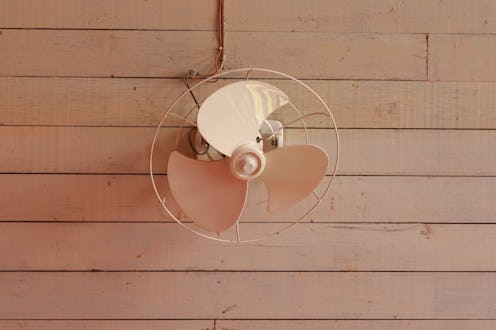Health
We Asked A Doctor If Sleeping With A Fan On Is Really That Bad For You
Oh, those summer nights…

It's summer. It's hot and humid. Sleeping without a fan under these conditions sounds downright bananas, even though you wake up with a pretty dry mouth. But is sleeping with a fan on bad for you? The answer actually depends on several factors, including your allergies. If you do rely on a fan to get you through the night, you can still use it under the right conditions.
"Sleeping with a fan can help to cool your body while you sleep, but it may cause more harm than good if you suffer from allergies," Dr. Seema Sarin M.D., director of lifestyle medicine at medical provider EHE Health, tells Bustle. "First, a fan is going to blow air around the room and with that, it blows around dust particles. If you are allergic to dust mites, it can exacerbate your symptoms with increased exposure." Fans can also circulate pollen, she says, which may make anybody with hayfever feel uncomfortable.
If dry air tends to make your airways irritated, a fan might not soothe you at night. "A fan circulating air around the room can promote drier air, which can lead to drying out of your mucous membranes and sinus irritation," Dr. Sarin says.
If you like sleeping, though, you might need to accept this necessary evil. "Your body typically will decrease in temperature by 1 or 2 degrees Fahrenheit below your body’s usual wakefulness temperature, to help get a good night’s sleep," she says. "If you absolutely need to use a fan at night, it’s best to regularly keep your fan and room as dust-free as possible."
If you have allergies, and you want to keep using your beloved fan, it's time to turn yourself into Monica Gellar from Friends. This means embracing cleaning as part of your daily routine, and investing in a quality vacuum. If you clean a little every day, it actually takes no time at all. Make sure you sweep, dust, and mop your room as often as possible, especially if you have dogs and cats that sleep in your room. Wash your bedding, including your pillows, often. If you have carpet and pets, vacuuming every day is a good idea.
You'll also want to dust surfaces, especially your night table. If you have wood floors, they need to be swept and mopped regularly. Cleaning your fan is also super important. If you have a free-standing fan, dusting the outside of it — front and back — can help. You can also take it apart and thoroughly dust and disinfect the blades on the inside of the fan a couple of times each summer. Have blinds on your windows? You're going to have to dust those, too.
"Keep the fan at a safe distance away from your face and body. Avoiding direct contact from the fan’s air is crucial to avoid your sinuses from becoming dry, and help keep you guarded against allergens and dust," Dr. Sarin says. "Keep as many windows open as possible if you do not have seasonal allergies to help the circulating air become refreshed by clean air from outside." If you do have hayfever, that's not going to be an option, so try and get air circulating in other ways.
There's really no way around this whole cleaning thing if you have allergies that are exacerbated by your fan. If you're feeling meh about cleaning, know that it can serve as a form of mindfulness meditation, which can reduce symptoms of stress and anxiety. Your fan won't aggravate your allergies, and you'll feel more relaxed. Who doesn't want that?
Expert:
Dr. Seema Sarin M.D.
This article was originally published on